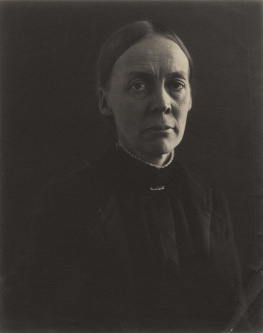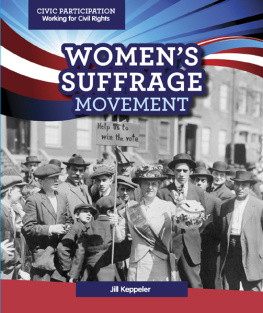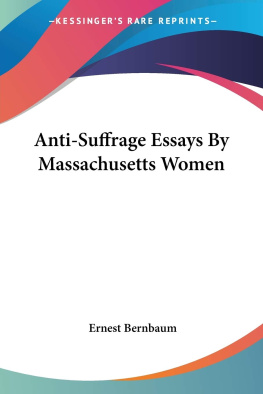Conservative and Unionist Women's
Franchise Association.
The Progress of the
Women's Suffrage Movement
by
Mrs. Henry Sidgwick
Presidential Address to the Cambridge Branch of
the C. & U. W. F. A. at the Annual Meeting on
May 23rd, 1913.
CAMBRIDGE
BOWES & BOWES
1913
PRICE TWOPENCE NET.
THE PROGRESS OF THE WOMEN'S SUFFRAGE MOVEMENT.
An address to the Cambridge Branch of the Conservative and Unionist Women's Suffrage Association at their Annual Meeting on May 23, 1913. By Mrs. Henry Sidgwick.
It seems to me sometimes that we do not cheer ourselves as much as we might by thinking of the immense strides our movement has made in the last fifty years; so I propose to say a few words about it this afternoon, although there is not of course anything very new to say. For we need cheering because, notwithstanding the general progress of our cause, we are just now suffering from a serious set-back due to the action of the militant societies. They are clearly and visibly setting people against us. And it appears that not only in this country are they raising up enemies against us, but that our militants are hindering the movement in other countries.
Moreover, what is much worse than injury to the special cause which our society exists to promote, the militants are injuring our country and the cause of civilization and progress. The very existence and usefulness of society depends on the maintenance of law and order. The protection of the weak, the possibility of development in well being generally, all that society stands for, depends on its members being law abidingon their respecting law and life and property. And here we have women, while urging that their admission to a formal share in the government of the country would be for its advantage, at the same time teaching by the most powerful method they can use,namely, exampledoctrines subversive of all social order; teaching that persons who cannot get the majority to agree with their view of what is advisable in the interest of the whole should injure and annoy the community in every way they conveniently canproceeding even to incendiarism, and apparently threatening manslaughter.
It is heartbreaking that such things should be done in a good causeand it is especially hard for women to bear because it hurts their pride in their own sex. They have to see not only their country injured, and the cause of women's suffrage, in whose name these things are done, retarded, but they have to see the reputation of their sex for good sense and sober judgment draggled in the mud.
This is the most seriousindeed, I think the only serious set-back our movement has had. It has on the whole been sufficiently wisely conducted to secure almost uniformly steady progress from its small beginnings to its present great proportions.
In allor almost allbig social movements ultimate success depends on the gradual conversion to benevolence of a large neutral majority. The movement in its beginningand this was eminently true of our movementis championed by a small body of pioneers. They make converts, and when they begin to be taken seriously a body of active opponents is probably stirred up, but so long as the active opposition is not too strong it does little harmit may even do good by helping to interest people in the question. But for a long time the great mass of people remain neutral. Either they have never heard of the movement, or they do not think it serious and only laugh at it, or they think the question unimportant and do not much mind which way it is decided, or they think immediate decision is not called for, and that they may as well wait and see. In fact, for one reason or another they do not think very much about it, and are not actively interested on either side.
Of course if such people are led to declare themselves prematurely, the natural caution and conservatism of human nature will usually make them vote against change. It is largely for this reason that good judgmenta sound political instinct as to what it is wise to press at any given momentis required in the leaders of a movement. And though it is no doubt very important to draw active converts from the large neutral class, it is still more important to prevent the enemy doing so. For it is not necessary to convert the great majority into active supporters. Success is finally achieved when a sufficient proportion of the originally indifferent have arrived at a more or less benevolent neutrality almost without knowing itso that the old indifferents come to believe that they always thought there was a great deal to be said for the proposed change, and the young indifferents grow up with a feeling that it has to come.
This change of feeling does not for the most part come from the direct influence of active propaganda. It is part of the general change in the social atmosphere, and comes from the pressure of circumstances of various kinds, from the unconscious influence of those who have made up their minds, and from all the innumerable and indescribable things which go to constitute the spirit of the age. The arguments and deliberate influence of the active supporters help, but a large part of their effect is indirect and unperceived at the time.
It is in their influence on the neutral body that the militants are doing most harm to the cause. They are exasperating the large undecided mass, and driving many of them into more or less hardened opinion on the wrong side. And once a man (or woman) has made up his mind, especially perhaps if he has made it up emotionally, it is much harder to move him. Of course the militants are also reducing some active supporters of the movement to lukewarmness, at least about the advisability of immediate advance, and thus losing the influence of such supporters. But I think the harm they are doing with the hitherto more or less neutral is more serious.
However, do not let us talk of the militant policy any more. I, at least, have enough belief in our cause to trust that it can live down that set-back. Feeling on our side is rising, I believe, like a tide, so that a little ditch cut across it will only retard it for a moment.
When I first became aware of the movementin the late sixties or early seventiesit was in the stage of being met by ridicule. People who were not in favour of it did not generally arguethey laughed. This no doubt kept the timid away, but as a matter of fact very few were interested. An old friend here was reminding me the other day of a meeting of the Cambridge Suffrage Society held she believes in the early eighties. I do not think I attended it myself, though I am not sure. It was an open meeting, and a lady from London was to address it. The committee did not venture to take any room larger than the Alderman's parlour at the Guildhall. But that was too large. The committee sat at the table near the speaker, and six or eight other ladies came in and were asked to sit close to the committee at the table, so as to look less scatteredand that was all the audience the visitor had to address. And that, according to my friend's general recollection, and my own too, was the usual type of the early meetings organised by the Cambridge Society.
But gradually all this changedand the degree of change may be measured by comparing with these early meetings those which have taken place at Cambridge in recent years. No one laughs now, or very few. The question is taken seriously even by opponents, and the number of people sufficiently interested to wish to hear about it is very large.
There is another measure of the progress made of which we old people, who have been suffragists for a long time, are conscious. We can see among our own friends and acquaintances people who have been doubtful but have now pronounced themselves in favour of giving women the parliamentary vote. I remember, for instance, a conversation many years ago with a lady who is now an ardent suffragist, but who surprised me then by her doubtful attitude. I see others who 20 or 30 years ago I should have expected to find opposed, now taking a leading part on our side in their own neighbourhoods. I remember another conversation in which a man who was or had been a Member of ParliamentI forget whichwas taking part and was expressing great doubts about the advisability or the advantage to themselves of giving votes to women. Some one present said that the increasing tendency to regulate by legislation industrial matters affecting certain classes of women specially, or affecting them differently from men, was an important reason why women should vote. He admitted at once that women ought to have the vote if such legislation were increasing, but he doubted the fact at the moment. That man is a supporter now. What impresses me is the number of people one knows who are now supporters, and even active supporters, and have become so without one's being able to point to any particular moment when what I may call their conversion took place.






